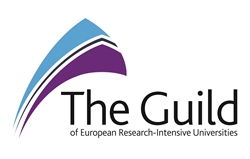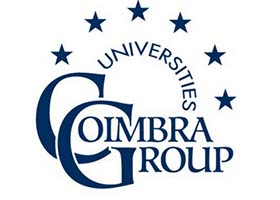Networks
As a globally focused institution, the University of Groningen engages in many types of international cooperation throughout both teaching and research. Our main networks are:
ENLIGHT

ENLIGHT is a new European university alliance uniting nine different universities: University of the Basque Country (ES), University of Bordeaux (FR), Comenius University Bratislava (SK), National University Ireland Galway (IE), University of Göttingen (DE), University of Groningen (NL), University of Tartu (EE), Uppsala University (SE) and Ghent University (BE).
The ENLIGHT consortium was selected in the frame of “European Universities", the European Commission’s pilot program for new multilateral networks. It is co-funded by the Erasmus+ Project of the European Union. Over the next three years ENLIGHT will focus on five themes to pilot new learning formats: climate change, health and well-being, inequality, digital revolution, energy and circularity. In the long term ENLIGHT wants to create an open space between the nine universities for learning, teaching and working together. It wants to empower learners as globally engaged citizens.
More information about ENLIGHT can be found in this article or on the ENLIGHT website. To celebrate the launch of ENLIGHT, an internal kick-off was held on 1 March, for which the stream is available to watch:
U4Society Network

The U4 Society was a strategic network from 2008 until 2019 that has been fully integrated into ENLIGHT and depicts the third pillar of the consortium.
The Guild

Composed of some of Europe’s most distinguished research-intensive universities, the Guild is dedicated to enhancing the voice of universities in Europe for the benefit of research and teaching. It will engage politicians, officials, public and private companies through debate based on cutting-edge scholarship. The Guild’s members are committed to sharing their knowledge, experience and good practice, for the benefit of all members.
Coimbra Group

Founded in 1985 and formally constituted by Charter in 1987, the Coimbra Group is a network of 37 long established European multidisciplinary universities of high international standard.
European University Association - EUA
UG is a member of the European University Association, which has 850 members from 47 different countries. Its publications address topics that are of relevance for university policy and management.
Other networks
- European Energy Research Alliance (EERA)
- EURAXESS
- The Asia-Europe Foundation (ASEF) and ASEAN University Network (AUN)
- The Association of Arab and European Universities - AEUA
- Asian European University network
Strategic Partnerships
The University of Groningen has established academic connections, which you see here below.
Universität Hamburg (UHH)
The University of Groningen and the Universität Hamburg have established many academic connections throughout their strategic cooperation, which has been strengthened by the official cooperation agreement concluded in 2019. There is a small seed money budget to foster cooperation in research and teaching. You can find the application form here soon. Additionally, the University of Hamburg is a member of the network ‘Verbund Norddeutscher Universitäten’, which the University of Groningen is also an associate member of.
Not only academic cooperation, but also municipal relations connect Groningen and Hamburg. Consequently, the themes ‘Energy Efficiency, Science and Research, Urban Development, Mobility and Public Health’ form the cooperation’s centre of gravity.
The Universität Hamburg, which celebrated their 100th anniversary in 2019, has been founded in 1919 during the emergence of the Weimarer Republik as the first democratically established University of Germany. The university, amongst many other pursuits, promotes world wide research, internationalization, quality enhancement and open access to academia. It embodies the greatest as well as most diverse research institution in Northern Germany, and concomitant the largest University in Hamburg. Furthermore, the Universität Hamburg is part of the PIER, a partnership for innovation, education and research, between the University and the DESY (Deutsches-Elektronen-Synchrotron).
The University’s research focus lies on Climate and Environment, Photon – and Nanoscience, Manuscript Research, Particle -, Astro – and Mathematical physics and Infectious Diseases. Subsequently, while attracting approximately 45.000 students a year, of which 16% are international students, the Universität Hamburg offers 72 Bachelor and 86 Master programs (42 are English-taught), which are facilitated at the 8 faculties.
In the World University Ranking of 2022 the Universität Hamburg has been ranked 132nd worldwide and 56th within Europe, which makes it part of the Excellence Group among European Universities. Next to the Universität Hamburg the University of Groningen also maintains strong connections to the other four universities located within the city of Hamburg.
Carl-von-Ossietzky Universität Oldenburg
The University of Groningen and the University of Oldenburg share a university wide partnership, which has been lasting over 40 years. Just recently, the cooperation agreement has been renewed, setting out the key focus areas in conjunction with their Roadmap for Cooperation 2020-2030. Seven fields, in which the universities specifically aim to deepen their cooperation in research, training and transfer, have been determined as well as the open possibilities for new initiatives and projects in other fields, which will be assessed during the annual meetings. The new agreement also includes active promotion of their cooperation through financial, organizational and other forms of support, wherefore more joint summer schools, seminars and exchange schemes, as well as introducing new joint study programs and degrees such as binational doctorates, have been included. In that sense, the student numbers, PhD collaboration and reciprocal student plus staff mobility shall be increased, as well as newly funded projects by the EU and other organizations included.
The seven fields specifically refer to:
- The medical sciences, by enhancing the medical training at the European Medical School plus the healthcare research at their joint Cross-Border Institute (CBI) under the motto of ‘Healthy ageing for a health society’;
- The research on Dutch/German linguistics and history, by organizing joint workshops, doctoral degrees and projects in cooperation with archives and museums, as well as by increasing student mobility between Groningen and Oldenburg;
- The area of energy transition and climate adaption, in regards to energy research conducted within the universities’ respective networks, as well as joint doctoral projects, building on the binational Master’s degree program Water and Coastal Management;
- The field of governance, law and politics for a sustainable society, by introducing dual Bachelor’s and Master’s degrees under the aegis of the Hanse Law School and scientific workshops to promote joint research in this area;
- Digital society and technologies, as the partners aim to consolidate and expand existing contacts in mathematics, computer science and other disciplines – in particular human-cyber-physical systems;
- Teacher training, by promoting and strategically expanding its internationalization, which is funded by the German Academic Exchange Service (DAAD), and cooperation, especially through raising awareness of cultural diversity among trainee teachers;
- Knowledge transfer, entrepreneurship and public engagement, by supporting the ‘Northwest Start-Up Region Germany’ beyond the German-Dutch border with the help of cross-border business start-up teams in order to contribute to creating a sustainable and responsible society through the diverse networks and connections of the knowledge transfer (including actors from business, culture and the public sphere operating through various transfer formats).
The Universitaet Oldenburg was founded in 1973, which automatically renders it one of the youngest Universities in Germany, and has as its aim to solve the societal question of the 21st century through interdisciplinary research and education. The University closely collaborates with 200 university partners and is connected to other institutes concerning research, education, culture and economy. The research location Oldenburg additionally offers the Helmholtz-Institute for functional marine biodiversity plus a virtual department, a Max-Planck-junior research group and three Fraunhofer-working groups. Furthermore, the research personnel of the University of Oldenburg is actively involved in special research areas, European projects and excellence cluster. Subsequently, the University attracts approximately 16.000 students every year of which around 1.300 are international students.
The University of Groningen values the University of Oldenburg as a regional partner and is confident that the collaboration will contribute to great results in regards to our strategic goals.
| Last modified: | 26 April 2022 10.28 a.m. |
